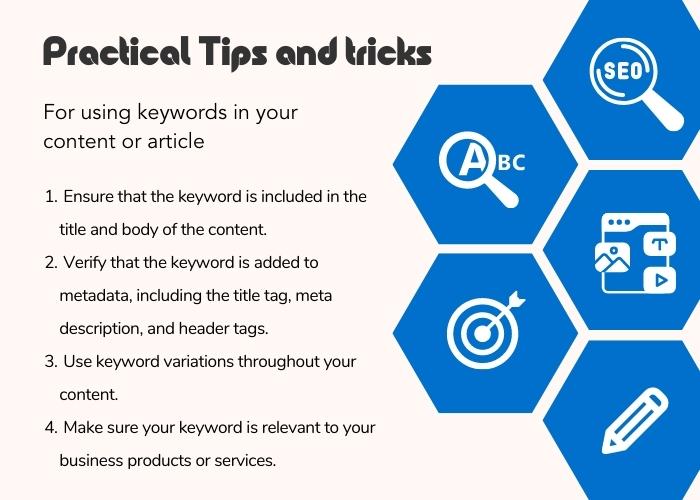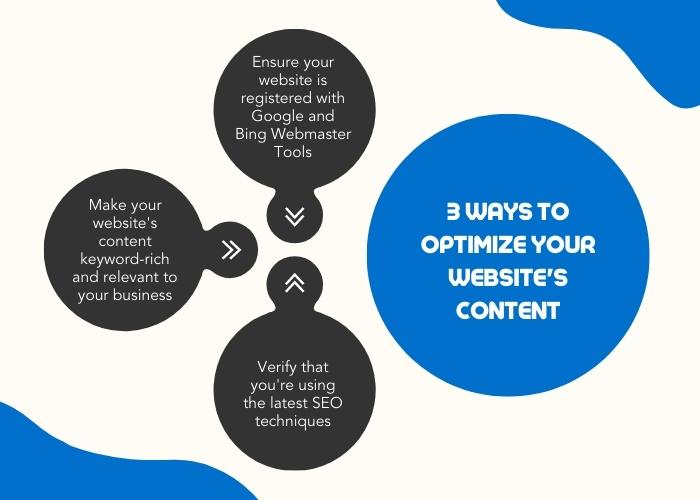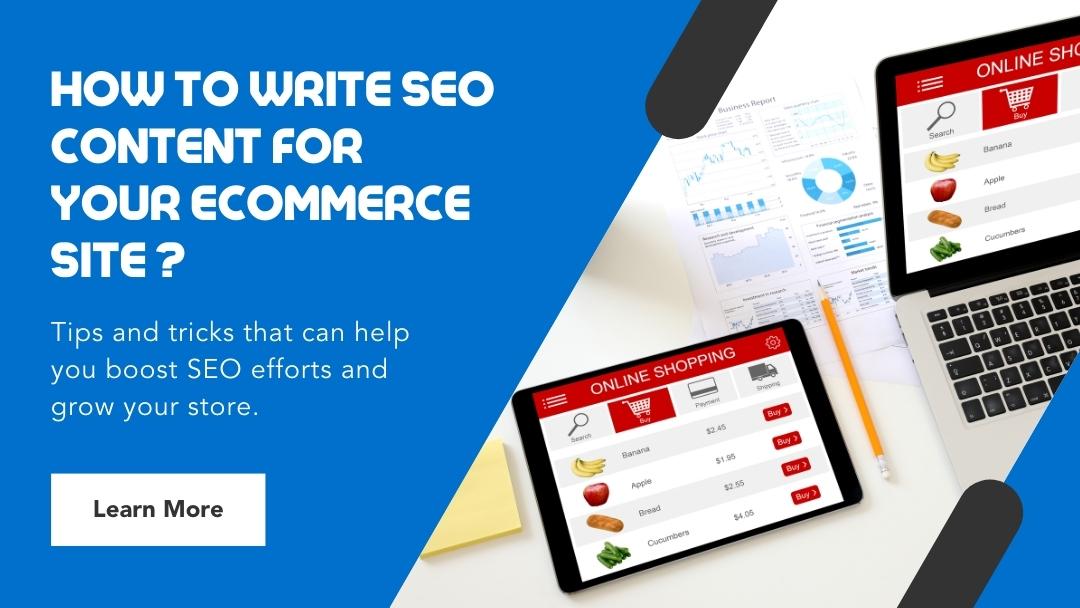How to Write SEO Content for Your eCommerce Site – An eCommerce SEO Guide for Content Writers
The desire of every online shop owner and digital marketer is to be able to promote their store and products quickly and easily. Since several different methods you might try to boost your store’s traffic, even through social media, SEO is one of the most organic, effective, and reliable in delivering results.
It is not only a requirement but a must that you switch to SEO-friendly content for your E-commerce store and all your sales and marketing channels. This may appear to be a difficult task at first, but it is something you can learn and will certainly help you in the long run.
Understanding how to write content for people and search engines is a never-ending learning process, but once you’re an expert, you can produce the best quality content. The more quality content you come up with, the more your brand will be recognized.
with, the more your brand will be recognized.
We will cover some additional tips and tricks that can help you boost your SEO efforts as you go along in this article.
Get ready to take notes. Let’s get started!
What is SEO? How Can it Benefit Your eCommerce Website?
SEO, or search engine optimization, is the process of improving the visibility and ranking of a website on search engine results pages (SERPs). This can be done through various methods, including keyword research and targeting, use of keywords in the contents, and optimization of website elements for maximum search engine exposure. E-commerce content for your website page optimization is considered an inexpensive medium for increasing traffic to your website by improving its visibility on SERPs. To get the most significant buyer’s traffic potential, you want your page to be as well rated as possible on the web.

Specific techniques you may want to use in your eCommerce SEO page content to ensure that the written material on your company’s website and platforms is of the highest quality.
Your goal is to reach as much traffic as possible, so you must verify that your website is optimized for search engines, from the keywords you select to the technological structure of your company and whether or not it is mobile-friendly.
SEO is essential because it ensures that your website shows up for users on search engine results pages when they search critical terms for your specific industry and the services you offer. SEO efforts drive organic, unpaid traffic to your website.
How does SEO work? When you input a query into Google, millions of results appear instantly!
But how does it work?
Google is designed in such a way that its users should be able to discover answers to their questions as quickly and efficiently as possible. That’s why Google has a crawler that searches the web for any information it can find. The indexed pages are then evaluated utilizing an algorithm that attempts to link facts with your request.
If you want to improve an eCommerce website’s SEO, this article is for you…
I’ll teach you how to research and target the right keywords, use them in your content, and optimize your eCommerce site for maximum search engine exposure. You will walk away with a better understanding of strategy and how to apply it to your own site.
What is keyword research, and why is it necessary for SEO and eCommerce websites?
Keyword research is the process of identifying keywords that are relevant to your business and its products or services. It involves researching what words and phrases people use to search for information online. You can improve your website’s visibility and rank on SERPs by targeting these keywords in your content.
The essential connection between SEO and content is using keywords and phrases to make your material more visible to online shoppers.
Why use keyword research for SEO?
Well, it allows you to get the right audience with your content. By identifying the right keywords, you can ensure that your content is seen by the right people – those who are most likely to be interested in your offer. Additionally, keyword research can help you identify potential customers and market segments you may not have been aware of.

Indeed, the result pages of various search engines can genuinely impact how easily discoverable your content will be. The more you can use SEO Services effectively to pick the keywords and phrases you put in your written content, the easier it will be for your target audience to search for them.
Why is SEO important for e-commerce?
- Search engine optimization is an essential digital marketing technique designed to help businesses increase their revenue. The more relevant your search results appear, the more likely prospects are to purchase from you.
- E-Commerce SEO improves customer experience by improving audience engagement. You’ll be able to satisfy your consumers’ expectations better if you invest in e-commerce SEO. Your website must be optimized to improve the user experience and get more sales to rank higher in search results.
- In E-commerce SEO, search engines assist you in spreading information about your company’s brand. Also, eCommerce SEO is an excellent method to get people interested in your business if they haven’t heard of it before. As a result, you improve your brand recognition. People will become more aware of your products or services, and there’s also a chance that your brand will remain in their memory. Thus, this can result in repeat customers, and probably these customers will share about your company.
- Primarily you help more consumers locate your products. Customers are actively looking for the products that your e-commerce company sells. You may increase product visibility and brand recognition via SEO for eCommerce.
How to do eCommerce keyword research for your page SEO eCommerce site
Ecommerce keyword research plays a significant role in gaining website traffic.
So how do you go about conducting keyword research for an eCommerce site?
It’s ple – all you need is a good keyword tool and basic knowledge of how to use it. In the next section, we’ll discuss some of the best keyword tools available and how to use them.
When conducting keyword research for your eCommerce site, you must consider the products and services you offer. You’ll want to target relevant keywords to your business and its products or services. To appear in relevant search results, you must choose the correct keywords for your product pages.
Several different keyword tools are available, each with its strengths and weaknesses.
Below are some of the most popular keyword tools and how to use them.
- Google Keyword Planner- This tool is free to use and allows you to research keywords based on their popularity and competition. It also provides information on estimated monthly search volume and keyword competition.
- Semrush- This tool offers a variety of features, including competitor analysis, keyword research, and backlink tracking. It also has a free trial version that allows you to test its features before purchasing a subscription.
- Moz Keyword Explorer Tool- This tool offers a variety of features such as keyword suggestions, SERP Analysis, and keyword difficulty scores. It also has a free trial version that allows you to test its features before purchasing a subscription.
Now that you know about some of the most popular keyword research tools available, let’s look at how to use them. In the following sections, we’ll walk you through the process of using each tool to search keywords for your eCommerce site.

How to use Google Keyword Planner:
1. Go to https://adwords.google.com/KeywordPlanner and sign in with your Google account information.
2. Click “Get Ideas” under “Search for new keywords using a phrase, website, or category.”
3. Enter keywords related to your business and its products or services into the “Your Product or Service” box.
4. Click “Get Ideas,” and you will receive a list of related keywords, their estimated monthly search volume, and keyword competition.
5. Select the keywords you want to target and add them to your ad group or campaign.

How to use Semrush:
1. Go to https://www3.semrush.com/features/keyword-research/ and sign up for a free trial account.
2. Enter your eCommerce site’s website URL into the “Domain” box and click on “Start.”
3a) If you want to research keyword ideas, click on “Keyword Gap” under “Keyword Research.” Then enter a competitor site’s website URL into the “Competitor 1” box and click on “Show Keywords.”
3b) If you want to research competitor keyword strategies, click on “Site Audit” under “Competitor Research.” Then enter the website URL of a competitor site into the “Domain” box and click on “Start Audit.”
4. You will receive a list of keyword ideas or a competitor keyword analysis report.
5. Select the keywords you want to target and add them to your ad group or campaign.

How to use the Moz Keyword Explorer Tool:
1. Go to https://moz.com/products/keyword-explorer and sign up for a free trial account.
2. Enter.a keyword related to your business and its products or services into the “Find Keywords” box and click on.”
Practical Tips and tricks for using keywords in your content or article
When using keywords in your eCommerce content, there are a few things to remember. First, you’ll want to ensure that the keyword is included in the title and body of the content. You’ll also want to ensure that the keyword is included in the page metadata, including the title tag, meta description, and header tags.
Including your keyword in these places will help to improve your website’s visibility and to rank on search engine results pages (SERPs). Additionally, you’ll want to use keyword variations throughout your content. This will help to ensure sure that your site appears for various searches.

Finally, you’ll want to ensure that your keyword is relevant to your business and its products or services. Targeting irrelevant keywords can hurt your website’s ranking and visibility.
Following these tips can optimize your website’s content for maximum search engine exposure.
How to optimize your website’s content for search engine exposure
When it comes to optimizing your website for search engine exposure, there are a few things you can do. First, ensure your website is registered with Google and Bing Webmaster Tools. This will allow you to track your website’s ranking and visibility on SERPs.
You’ll also want to ensure that your website’s content is keyword-rich and relevant to your business. In addition, use keyword-rich titles, meta descriptions, and header tags on your web pages. This will help to improve your website’s ranking and visibility.
Finally, make sure that you’re using the latest SEO techniques. Stay up-to-date on the latest trends and changes in search engine algorithms. This will help you to improve your website’s ranking and visibility over time.

Ecommerce SEO strategy to help you boost your ranking among other eCommerce sites
SEO is constantly evolving, so staying up-to-date on the latest trends and changes in search engine algorithms is essential.
Here are a few additional SEO strategies we have come up with to help you boost your ranking:
1. Use keyword-rich titles, meta descriptions, and header tags on your web pages.
2. Optimize your website for mobile devices. Make your site an SEO-friendly website.
3. Publish high-quality content that is relevant to your business.
4. Increase your website’s page loading speed.
5. Use social media to promote your content. It’s a practical eCommerce SEO strategy.
6. Connect with other websites in your industry. Be aware and familiar with other eCommerce websites.
7. Improve your website’s usability and design.
8. Get involved in online forums, discussion groups, and other social media platforms. Make people aware of your company.
9. Conduct keyword research to search for the right keywords to target.
10. Monitor your website’s ranking and visibility on SERPs.
Best Practices in Writing SEO Content for eCommerce websites and articles
Finally, make sure that you’re using the latest SEO techniques. Stay up-to-date on the latest trends and changes in search engine algorithms.
Below are some but full best practices that will help you to improve your website’s ranking and visibility over time:
- Use the right keyword and phrases – When it comes to keyword research for eCommerce websites, product pages, or content, you want to ensure you’re using the right keyword and words. Use keyword research tools like Google AdWords Keyword Planner, Moz Keyword explorer tool, and semrush.com to find the right keywords to target.
- Include keywords in title tags – Title tags are one of the most crucial on-page SEO factors. Make sure to include your keyword in the title tags of your E-commerce product pages. Your E-commerce customers use keywords to seek relevant products while using a search engine, so you’ll need the right keywords to get your products in front of potential buyers. Start by browsing your product categories to see if there are any other keywords you can come up with. You may acquire a list of keywords to utilize on your product pages from this search. Long-tail keywords are what you want to focus on while doing keyword research. Three or more words is the maximum length of a long-tail keyword. You must use it to increase the number of qualified prospects for your company. Long-tail keywords are often preferred since they bring in more quality visitors. You may succeed with specific short-tail keywords (keywords that have a few letters in them), but you’ll have to compete with many other businesses for such keywords. Even long-tail keywords in a search might make it challenging to establish the specific purpose of the searcher. Long-tail keywords are far more specific in their search intent than short-tail keywords. The searcher’s intent focuses narrowly on long-tail keywords than on short-tail ones. As a result, using lengthier keywords is essential to succeed in E-commerce SEO.
- Use keywords in meta descriptions – In addition to including your keyword in the title tags, you also want to ensure you have it in the meta descriptions of your eCommerce websites and product pages. Meta descriptions are the short descriptions that appear under your title tag in the search engine results pages (SERPs). In addition to the title tags and meta descriptions, you also want to make sure you use your keyword throughout the page, including in the headings (H1, H2, H3) and the body copy. Meta descriptions play a crucial function in supplying them with information about your website. With enticing meta descriptions, you’ll see an increase in sales. When optimizing a website for SEO, the title and headers on your page are critical. Users usually gather essential information from this excellent text, but search engines read it first because of its importance. Consider your H1 the main heading on a page, also known as the title. Ensure your H1 includes your target keyword while still ing to visitors.
- Optimize images and Optimize the length of your articles – When it comes to E-commerce product pages, appearances are important. Make sure to optimize your images by including keyword-rich ALT text. This will help your photos appear in the search results when people search for those keywords. Also, many individuals believe that lengthy postings can contain many keywords and phrases, yet this is not the case. What matters to search engines like Google is quality rather than quantity. The more informative and well-researched your article is, the higher it will rank online. Keeping your sentences under a specific word limit will also help your content perform better. This shows that what you say is straight to the point and engaging enough without being too lengthy for the reader. The goal and design of your content should be to provide value to your readers. When you write, your articles should only address your audience’s topics. It will be much simpler for your target audience to discover them if they are as short and direct as possible—even a tiny piece of writing when adequately optimized, even a little bit of paper.

- Create helpful content and think about your target audience – As a rule of thumb, make sure your content fits the searcher’s purpose while creating it. Use your keywords to find out what other businesses have to say about a subject. It will assist you in creating content that better reflects the searcher’s goal, allowing you to get to the top of the results. Additionally, ensure that the E-commerce content optimization and formatting are done right. Your content must also have a conversational tone, and the data should be presented in an easy-to-understand style. Avoid jargon and phrases exclusive to your industry. Customers should be able to search for the material they’re looking for on your site simply by skimming it. Always ensure your content is simple enough for a reader to browse through quickly. Use short paragraphs, bullet lists, and headers to make it simpler since one of the most crucial things you must consider is your target audience. You’ll want to choose a customer for your E-commerce store based on the items you’re selling. It would help if you considered their age, location, gender, and fashion-related preferences. All of these can assist you in forming a particular sort of consumer and tailoring your content to their demands. The more finely tuned your postings are, the easier it will be for these folks to click on your links and discover your goods. Targeting a specific demographic will aid you in developing your brand’s narrative and improving your online presence as a business.
- Choose the appropriate headings and subheadings – Aside from keywords, you must make sure that your various subheadings correspond to the title you pick for your post. Your written material should have a smooth flow and stick to one theme only. Attempting to discuss several things at once will confuse your readers and your SEO strategies. Keep the following points in mind when creating your content’s title and subsidiary headings. These will assist you in optimizing your material for the various search engines while attracting the appropriate consumers. As a result, you must decide the precise subject you’ll be addressing each time. This will not only assist you in choosing the right keywords but will also narrow down your niche. As a result, your material will be more likely to remain relevant on certain search results pages.
- Look and compare with your competitor’s websites – It might also be a good idea to look at what your competitors do regarding SEO for their businesses. While you might have planned out your keywords and content correctly and done everything well, there can always be something new to learn. Looking at your competitors’ websites can help you get some inspiration and rethink how you present your products. While copying what others do is not ideal, you can always get inspiration. Whether they use different keywords, images, or promotional hashtags for their products, you can try out some new ideas and see how they perform. This way, you can stay on track with recent trends and expand your brand quickly.
Our takeaways for you
- Make sure you give your audience what they want. Determine the purpose of each user’s intent.
- Begin with keywords that the majority of people are looking for on Google.
- Choose keywords that are more highly targeted with fewer (but significant) search volumes and excellent conversion rates.
- Keep an eye on the competition. Respond to issues your rivals aren’t aware of and devise the best solution.
- Start by focusing on a small area and then branch out from what’s working.
- Blogs on hot issues are an excellent method to stay current and on top of trends. Utilize the presence of social media.
- For content marketing keyword research, optimize for search engines and human readers.
- Strategic keyword placement in meta tags and text is integral to on-page SEO.
Conclusion
E-commerce SEO content, especially video and audio material, improves website exposure, generates new leads and consumers, and extends brand loyalty. E-commerce SEO content not only takes an hour to develop but also time; be patient. You may consider following the suggestions in this blog to outpace your competition. You may hire a professional service provider if you don’t know enough.
Search engine optimization (SEO) can significantly assist your eCommerce website in expanding and getting more popular. These basic yet efficient ideas we’ve shared can assist you in rapidly and effortlessly increasing your sales. While social media marketing and other promotional tactics are beneficial, SEO-friendly content will help your website gain the recognition it deserves.
And the list doesn’t stop there. There is so much that goes into building an SEO-friendly website; it takes a whole team of experts to get the desired results. But one of the most important things you should do for your website is written quality content. Consistently producing quality content, you’ll generate more inbound leads.
Which suggestions will be the most beneficial for creating SEO-friendly content for your eCommerce company? Let us know what you think in the comments below!



